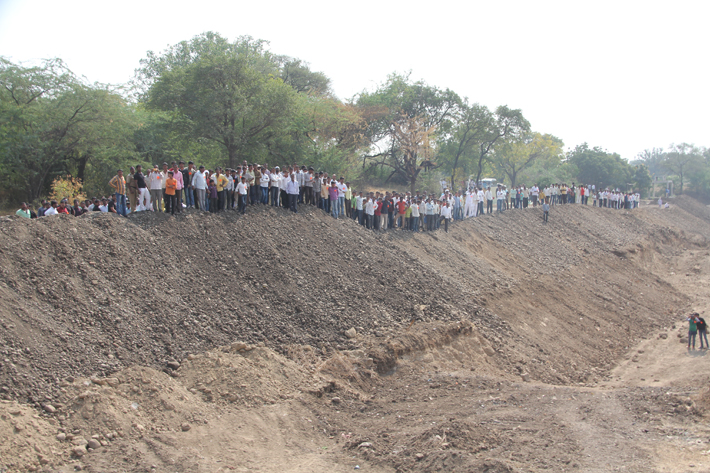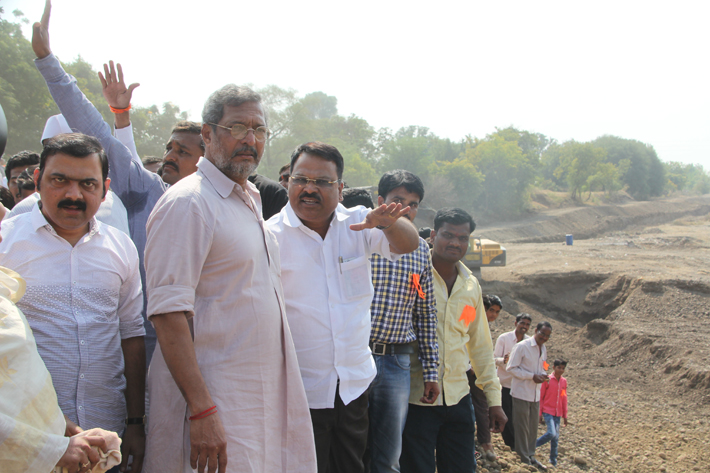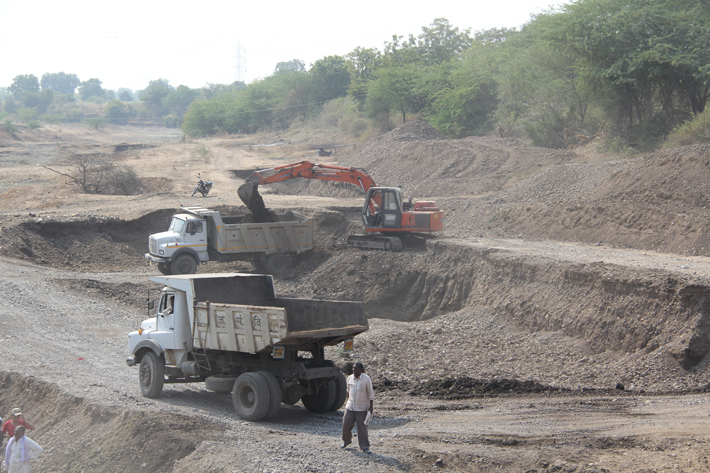Standing on the dry Bindusara river in the middle of Loladgaon village, in Beed district, Maharashtra, Veersen Ghodke, a farmer, points to a well and says, “This is my bawadi [well]. It is dry now. In 1992, the village saw flood; my grandparents were evacuated and they died later. We also lost 25 animals.” Since that day, he says, “he and other villagers have been leading lives full of sadness.”
Once the lifeline of Loladgaon, Bindusara river has today turned into a dry patch and a flat track after a series of failed monsoon seasons. The villagers say that during the rainy season the river was in spate and its surging waters broke the bund. Thereafter, the river could never hold water and began to flow away in all directions. The diminishing water table caused water scarcity in the village. After two decades of erratic and receding rain, the Marathwada region is now caught in a protracted drought.
"Farmers feel they are alone, they are losing self respect" | Interview with actor Nana Patekar
“Sheila Kaul [union minister for urban development during Narasimha Rao government] came here to see the situation. She did some tokenism and promised a lot, but nothing changed,” says Veersen. His nephew Ganesh Ghodke adds, “Many MLA’s and MP’s also came here but did nothing to help.”
Another local farmer says, “For past four years, we haven’t even received average rainfall. In 1991, we received surplus rain, but it flowed out. God knows what will happen in the future.”
According to data available with Beed collector office, the region’s recorded average rainfall is 666 mm; in 2015 it was down to half at 319 mm and a year before that one third of the average. This has resulted in more than 10,000 villages of Marathwada facing acute drought for nearly three years. The situation is only getting worse and forcing nearly six lakh farmers to migrate to Sangli, Satara, Kohlapur, Pune and Sholapur where they work as farmhands – mostly in sugarcane fields. Most of them have left children and old people at home; many houses in the region are permanently locked.
As a result, today in Marathwada, vast swaths of farmland is dry and cattle are dead due to scarcity of fodder. Drought has added to the poverty and farmers’ inability to repay loans.

“For the last 18 years we have been taking files to the administration, but all in vain. We now realise that nothing can change the situation for us,” says Ganesh. But change is on the cards.
One can see heavy machines dredging Bindusara river bed to widen its lumen along two kilometres that passes through Loladgaon village. Masons are seen repairing the bund. The task of rejuvenating the dead river is being undertaken by Naam Foundation founded by veteran actor Nana Patekar and popular Marathi actor Makarand Anaspure in September 2015.
The foundation’s project is the only ray of hope for hundreds of farmers in Marathwada.
“Once the river comes back to life and its orginal shape and starts holding rain water, it will automatically lead to increase in water table. This will help more than 10,000 families in seven villages,” says Keshav Rao Aghav, a private civil contractor, who is executing the project. He works as a volunteer for Naam.

“We told Nana that if we do basic water seeding, it will answer many of our problems. The aim is to increase water bank. We started by asking villagers to identify spots where water could be stored for increasing the underground water table” he explains. For this, the river bed has been excavated five to seven metres deep and 100 meters wide. This cavity can store 1.5 million cubic metre water. The excavated
soil and sand goes into making river bank and a walking track. The foundation has plans to plant trees along this.
For the government, such a project would cost Rs 4.25 crore and take one-and-a-half-year for completion, however, the Naam has given itself two-anda-half-months to complete the project, which was started on December 9, 2015. The villagers’ chip in voluntarily to buy diesel for running the dredgers.
“The scheme is expected to benefit 5,000 farmers. Approximately 1,000 bores and wells will fill up and there will be a rise of 5 metre in underground water table after one season of rain,” Aghav says.
Shivram Ghodke, an organic farmer, says that the project has set a new benchmark in development. “This is the best example of public-private partnership.
With Naam as a guiding force, our dependence on the government is gone. Naam is our hope and strength, it has changed our vision. We now know that we can bring change,” he says.
Ghodke was chosen by the villagers as coordinator for the Naam-led river rejuvenation project.
No wonder the villagers are not tired of singing peans to their favourite actors Nana Patekar and Makarand Anaspure. “Not only ours, but surrounding villages will too get water through this project,” says Veersen, with pride. “Next year Beed will get this water to drink.”
Bhanudas Sonawar, 90, says he is happy to see the river rejuvenation work in his lifetime. Another nonagenarian, Ashruba Ghodke – who claims he was only 25-year-old when Marathwada was ruled by the Nizam says, “We are very satisfied with this work. This
opportunity will never come again.”
Beyond Beed
Farmers from other villages are flocking to Loladgaon to seek help from the foundation. A group of 70 farmers from Nitrud village in Majalgaon taluka has come to see the ongoing work; they want to replicate the water management model in their village. They have come in hired private buses. This is their third visit to Loladgaon.
 Datta Date, a visiting farmer, says he was impressed with the work, “We came here to see how Shivram Godke is doing organic farming. Naam announced that they will help us too.”
Datta Date, a visiting farmer, says he was impressed with the work, “We came here to see how Shivram Godke is doing organic farming. Naam announced that they will help us too.”
Two farmers in Date’s village have recently committed suicide. Media reports claim that over 600 farmers in Maharashtra committed
suicide in 2015. But the state government, in response to a PIL, has told the Bombay high court that the number of farmer suicides in Maharashtra stood at 1,000 last year.
Speaking to Governance Now, Naam co-founder, Makarand Anaspure, says, “It has not rained since June last year. Many farmers are not able to repay their loans due to crop failure and rise in temperature. The government has not waived off their loans.”
At village Pimpalner, 20 km from Loladgaon, 12 poclain machines are finishing excavation work for connecting 22 km of rivers Riddhi and Siddhi, which had lost their path due to climatic changes and encroachments. The machines are digging streams that earlier fed the twin rivers. “Both rivers will store 2.5 million cubic metre water after the rain ends water shortage. In August you will find these rivers full. Even with short spells of rain, these rivers will be full,” says Aghav.
This project will benefit villages of Ambasawali, Manyarwadi, Mankurwadi, Belwadi, Bedkuchiwadi, Sandarwadi and Mugaon – home to about 10,000 farmers’ families.
Being familiar with the government’s ways, Aghav says similar work would have cost government about Rs 6 crore, but it is costing around Rs 75-80 lakh to the foundation.
“Unlike government processes, there was no land acquisition or encroachment issues here (with Naam).”
Raju Bhau Shelke, coordinator, Naam, explains: 30% of cost (for government) are taxes. Besides it takes years to get permissions and
sanctions for the work to begin.
Here people are ready to chip in as they trust the Naam Foundation; a farmer gave up his land as it came in the way of the river. Naam is working on providing permanentsolutions for water shortages.
Aghav says, “We decided to work on the basic concept that not a single drop of rain water should be wasted and it must percolate. The phenomenon of drought in this region must end.”
Naam is excavating 109 km of river length in Beed district which can irrigate 10,000 hectares land. The stored water will percolate underground across a 10 km radius filling up wells as well.
Naam Foundation says Beed collector, Nawal Kishore Ram, and CEO, Zilla Parishad, Namdev Nanaware, had went extra mile to facilitate the work. Naam has received Rs 22 crore in donations as its offices in Pune and Aurangabad continue receiving calls from those willing to donate.
According to Shelke, Naam is able to help farmers as it has no political agenda. “We are telling people that this work is for you. If you come together we will manage the rest. We are not here to fight elections; we will leave once the work is complete” he says.
Beed’s 500 villages get drinking water from Majalgaon – 70 km away – through water tankers. “If the rain water of one season is preserved it will last 17 years,” adds Shelke.
Aghav’s childhood memories included the tiresome long distance walks of his mother and sister for fetching water in his village, Taradghavan, Shirur. After making a career as a government contractor, he decided to change things. He visited Rajasthan and Shirpur
in Maharashtra to study the local water conservation models.
His first experiment was with Amruta river; he excavated seven kilometer of streams that once fed the river and had dried up. He connected these to the river and repaired its banks to hold water. With each rain, the water table in the area kept rising, wells had water and arid land had turned green.
“I made a presentation to Beed district collector, who later showed it to the chief minister, Devendra Fadnavis. I met Nana and he told me to start work right away,” he says.
Naam’s work is getting positive response from the locals. On January 26, Nana Patekar inaugurated 25 km water management project in Jalna. In Parbani, dredging of a river is on and farmers are also being provided with drip irrigation in Zadi and Akola Dev. The list of ongoing work on water conservation is long.
Other initiatives
The foundation is constructing a school building in village Shingharwadi in Shirur. Students are made to plant ten trees each for increasing the green cover of the village. Each child is given responsibility of looking after these trees for ten years. 150 toilets are being constructed for houses without one and 10 houses will be constructed for the homeless. Naam has provided 34 bicycles to girls in Belwadi village where they had to walk 12 km to reach school. It has also started imparting skills to women in computer education and stitching. The foundation is also linking women’s products to markets and solemnising mass marriages. Besides it has given 100 goats to clusters of women for
livelihood.
“A 10th standard student, Swati Pithale committed suicide as she did not have money to pay Rs 260 for her bus pass. In her suicide note she asked her father not to spend on her last rites and utilise the money for her sister’s education,” says Anaspure. With this inspiration,
he says, Naam is also organising mass marriage of girls in villages.
With more people keen to join the Naam effort, the foundation is receiving calls for donation from overseas. It is now waiting for permission to receive foreign donations. “Not just in Maharashtra, a societal change will happen on a national level if celebrities join hands. This should become a movement. If companies use CSR, it can go a long way in bringing in transparency, plugging leakages and management
of disaster,” adds Anaspure.
geetanjali@governancenow.com
(The story appears in the March 1-15, 2016 issue)

